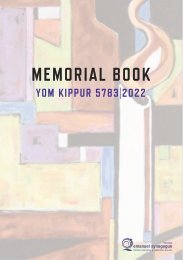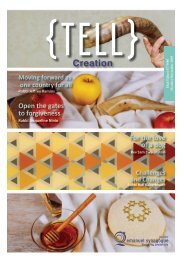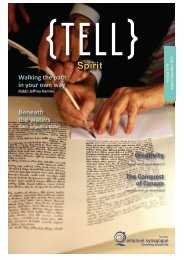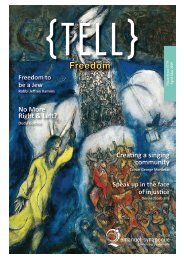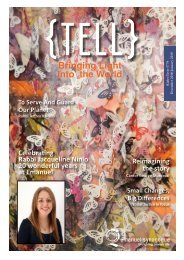TELL magazine: December 2020 - Emanuel Synagogue
The magazine of Emanuel Synagogue, Woollahra, Australia
The magazine of Emanuel Synagogue, Woollahra, Australia
Create successful ePaper yourself
Turn your PDF publications into a flip-book with our unique Google optimized e-Paper software.
By Cantor George Mordecai
{RECOGNISING THE CONTRIBUTION OF
JEWS FROM ARAB LANDS}
I recently had the opportunity to address the congregation
on a topic very close to my heart.
The Shabbat of 27–28 November
was designated Jews of Arab Lands
Shabbat—a time to remember the
cultural contribution of these Jews,
to celebrate their culture and history
and to commemorate the losses they
incurred during the late 1940s and
early 1950s when so many Judeo-
Arabic communities were forced to
leave their homes in the countries
they had lived in for centuries.
I am very proud of my Judeo-
Arabic heritage. I have clear and
strong memories of my siti’s (my
grandmother’s) and my siyidi’s (my
grandfather’s) home. On Shabbat
and Sundays many of their Iraqi
Jewish friends would visit, drink
kahwa (strong black Arabic coffee),
play Tawlee (backgammon), eat
baklawa and listen to Oum Kultoom,
Fairuz, Abdel Wahab and other great
Arabic singers and composers. Songs
like ‘Lama Bada Yatathana’, an old
Andalusian love song, and ‘Faug
Nahal’ were standards at their home. 1
All four of my grandparents spoke
Arabic as their first language. My
cousins and I all grew up with the
sounds of Arabic etched in our hearts.
My family are very strong Israel
advocates. So, while the food and
the music of the Middle East was an
integral part of my upbringing, the
Arab countries were definitely seen as
the enemy.
All of this pointed to something
deeply complex. They—the Arabs—
were totally ‘other’; yet, not at all.
We shared so much: language, food,
music, customs, humour—yet our
religions and culture were, and
continue to be, in a life-and-death
struggle.
Truthfully, Jews were part of the rich
mosaic that defined Islamic civilisation
from its very beginning. Some
historians wish to idealise the historical
relationship between Jews and Arabs,
emphasising cooperation, friendship,
Golden Ages; others paint a darker
picture of inequality and Islamic
contempt for Jews and Judaism. The
truth, as always, is somewhere in
between these two extremes.
There were periods of greatness when
Jews, Muslims and Christians of the
Middle East lived in harmony and
when cooperation and collaboration
created breakthroughs in science,
medicine, literature and mysticism. In
Abbasid Iraq, from 750 to 1000 CE,
and during the Spanish Andalusian
Golden Age, Jews played a crucial role
in the development and advancement
of those civilisations. However,
with the clash of Jewish and Arab
nationalisms during the late Colonial
period, Jews living in Arab and Islamic
lands began to pay a heavy price.
Iraqi Refugees after arrival in Israel, 1950 - National Photo Collection of Israel
18



